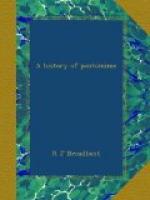Tragedy and Comedy now began to raise their heads, yet they could not, for some time, do more than bluster and quibble. There is an excellent criticism on them by that distinguished statesman, poet, scholar, and brave soldier, Sir Philip Sydney. “Some of their pieces were only ’dumb shews,’ some with choruses, and some they explained by an Interlocutor,” says an old writer on the subject. The mention of Pantomime in connection with tragedy, and as an example how Pantomime was requisitioned in Shakespeare’s time, is shown in the Second Scene of Act III. of “Hamlet,” wherein the “dumb shew” is given by the players.
The true drama, however, received birth and perfection from the creative geniuses of Shakespeare, Beaumont and Fletcher, Jonson, and others. Though the stage no sooner began to talk than it grew scurrilous, and plays were thought “Dangerous to Religion, the State, Honesty, and Manners, and also for Infection, in Time of Sickness.” Wherefore they were afterwards for some time suppressed. But upon application to the Queen and Council they were again tolerated under the following restrictions: “That no Plays be acted on Sundays at all, nor on any other Holidays till after Evening Prayer. That no playing be in the Dark, nor continue and such Time, but the Auditors may return to their Dwellings in London before Sunset, or at least before it be Dark.” The foregoing is from Stow, and this Act was made in the reign of Elizabeth. The Virgin Queen does not seem to have cared much about this enactment, as we find that on Sunday, the 24th September, 1592, she and her Court attended a play at Oxford.
As Tragedy and Comedy progressed on the English stage, Pantomime, as far as it was associated with the dumb shows in the early English drama, became, little by little, a thing of the past.
We have seen, and traced, from the Creation of this planet, and through succeeding ages, how Pantomime has always flourished; we have seen also how the Interlude gave way to the Comedy; we will now see how this love of light entertainment formulated in this country by the Interlude, and, about the same time, by the Italian Masque Comedy, the progenitor of Pantomime (referring to the whole as a spectacle), and the forerunner in France, also of that other form of light entertainment known as the French Vaudeville, cultivated by Le Sage and other French writers of note.
To go to the bed-rock for our facts, and for the innovation of all this, it is necessary in thought, and perhaps as well in spirit, to journey to Italy.
CHAPTER X.
The Italian Masque—The Masque in England—First appearance in this country of Harlequin—Joe Haines as Harlequin—Marlowe’s “Faustus”—A Curious Play—The Italian Harlequin—Colley Cibber, Penkethman—Shakespeare’s Burlesques of the Masque—Decline of the Masque.




